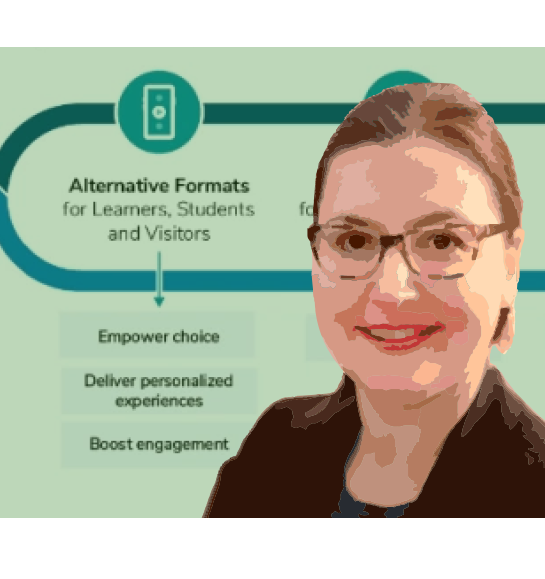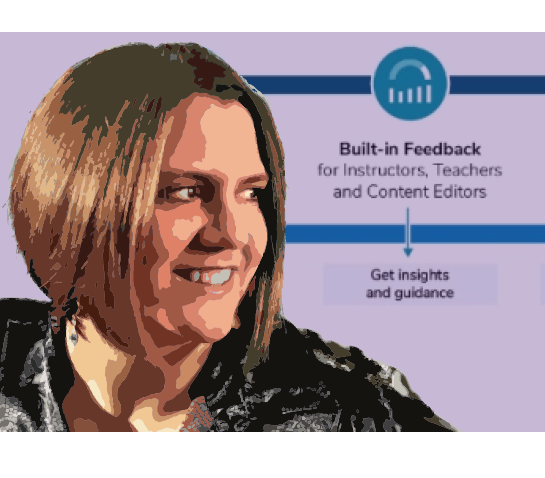Instructor Spotlight: Thoughts on using Anthology Ally for Accessibility with Dr. Lieke van Heumen and Dr. Kate Floros
quote Heading link
I’m very happy that Ally is accessible to UIC instructors and students. I think it’s brilliant, and I hope that the tool catches on and that people will use it.
Text Heading link

For the past three decades, the World Wide Web Consortium (W3C), an international standards organization for the Internet, has been providing a set of recommendations for making web content more accessible, primarily for people with disabilities. These recommendations, Web Content Accessibility Guidelines (WCAG), are currently being updated for Version 3, which will eventually improve on the current standard WCAG 2.2. Accessibility has become a leading issue in higher education, especially as Universal Design for Learning (UDL) has expanded the meaning of the word accessibility to accommodate individual learning differences even without a letter of accommodation. To bolster UIC’s commitment to accessibility, Anthology Ally was acquired earlier this year and became available in Blackboard in August. As accessibility and Anthology Ally have raised many questions about practicing UDL across the university, Learning Technology Solutions spoke to two instructors about their experience with creating accessible documents: Dr. Lieke van Heumen, Clinical Associate Professor in the Department of Disability and Human Development, and Dr. Kate Floros, Clinical Associate Professor for Political Science.
lieke Heading link

Dr. Lieke van Heumen’s Accessibility Journey: A Commitment to Proactive Measures
Dr. Lieke van Heumen, a faculty member in Disability and Human Development, is no stranger to the necessity of accessible course documents. However, she also recognizes that creating an accessible environment is by no means simple, emphasizing the learning curve associated with tools like Ally. Dr. van Heumen reflected that prior to the introduction of Ally creating accessible documents for her course DHD101 took a significant amount of time. With Ally, she has been able to significantly shorten the amount of preparation time since it creates many alternative formats for her. Additionally, the use of Ally educated her on how to further improve the accessibility of course documents. In her courses, Dr. van Heumen provides up to four different types of formats for her students to access readings on Blackboard: the original file, a screenreader-accessible version in Microsoft Word, a read-out-loud MP3 audio version, and a plain language summary. Video lectures are captioned and accompanied by a full transcript, an audio version, and a plain language summary. When asked why she and the other members of her instructional team devote so much time to creating accessible formats for her students, Dr. van Heumen stated, “Students should be proactive in using Ally, but the burden of accommodation shouldn’t solely be on them. I’m now uploading materials using Ally to provide various formats instead of creating them myself, but awareness is crucial. Students may not be familiar with Ally, and exposure to alternative formats is important so students can experience how such formats can aid their learning.” Dr. van Heumen underscored the necessity for supporting faculty to use Ally and advocated for a fundamental shift in mindset to foster accessibility.
Moreover, she offered practical tips for faculty, suggesting a step-by-step approach to make the implementation of Ally less intimidating: “Pick one class this academic year, scan your documents, consult with an instructional designer, and identify one thing to improve accessibility. Then, with each new upload, ensure it’s accessible. Be proactive rather than retroactive. Then the following year, you can build on your previous efforts,” she advised.
Kate Heading link

Dr. Kate Floros’ Accessibility Journey: A Podcast Sparks Change
On the other hand, Dr. Kate Floros, a faculty member in the Political Science department, detailed that her accessibility journey was recently initiated by an unexpected email related to her podcast, The Politics Classroom. A listener asked if Dr. Floros could provide a transcript for the podcast so that the listener could recommend it to others. This prompted a curiosity into the accessibility of her own academic materials, which led to a deep dive into the world of accessible documents. With a focus on proactive measures, she decided to begin working towards a certificate in digital accessibility through the ION Professional eLearning Program, citing the positive impact of accessibility training.
When asked about whether she uses Ally to check her documents, she noted that Anthology Ally really just works as an indicator; it does not fix documents for instructors using the tool. She also recognized that her training in accessibility measures has helped her to understand Ally’s instructions, but that some beginners may take longer to understand what necessitates remediation. More importantly, Dr. Floros is exploring how UDL can look in her class. She not only considered the accessibility of documents but also delved into what accessibility and inclusion could mean beyond just files. She incorporates gamification into her classroom to increase engagement, but she also incorporates it thoughtfully, allowing students to take quizzes on Kahoot, for example, at the student’s convenience. When asked about assessments and policies, Dr. Floros stated, “Now I offer rewrite opportunities, student choice of submission formatting (for example, they can submit a paper or they could create a narrated PowerPoint), more flexible attendance policies, and extended due dates—all aimed at accommodating students’ diverse needs. It’s about creating fairness and flexibility without compromising educational standards.”
Incorporating Their Approaches into the Broader Discourse
In exploring their approaches, it is evident that both instructors align with the broader university commitment to accessibility through not only the integration of Anthology Ally but also the attention given to accommodating students’ needs. Their experiences provide valuable insights into the challenges and successes associated with implementing accessible documents, contributing to the ongoing discourse on fostering inclusive learning environments within higher education.
As Dr. Lieke van Heumen aptly put it, “I’m very happy that Ally is accessible to UIC instructors and students. I think it’s brilliant, and I hope that the tool catches on and that people will use it.” These instructors’ proactive approaches and dedication to fostering accessible learning environments underscore the significance of ongoing efforts to create an inclusive educational landscape. If you are interested in improving the accessibility of your course and want to learn more about Anthology Ally, LTS encourages you to contact us at LTS@uic.edu.